

As Ds and Fs soar, schools ditch inequitable grade systems. A few years ago, high school teacher Joshua Moreno got fed up with his grading system, which had become a points game.
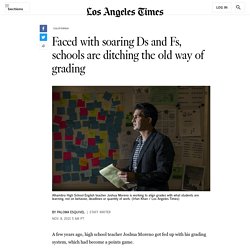
Some students accumulated so many points early on that by the end of the term they knew they didn’t need to do more work and could still get an A. Others — often those who had to work or care for family members after school — would fail to turn in their homework and fall so far behind that they would just stop trying. “It was literally inequitable,” he said. A@L Newsletter 2nd issue JUN2021 v. Sir Ken Robinson obituary. The educationist Sir Ken Robinson, proponent of the encouragement of creativity among children, who has died aged 70 of cancer, was largely ignored by politicians of both main parties as he insisted that the policy of successive UK governments, that literacy and numeracy should predominate, was a false priority.

As he told interviewers: “That’s like saying let’s make the cake and if it’s all right we’ll put the eggs in.” Reputedly one lesson can change the course of a pupil’s career – Robinson became an exemplar of the much rarer idea that one speech can change a teacher’s whole trajectory. Student peer review as a process of knowledge creation through dialogue: Higher Education Research & Development: Vol 0, No 0. This study contributes to a better understanding of the potential of student peer review in higher education by examining how repeated practice influences student learning.
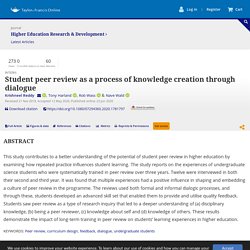
The study reports on the experiences of undergraduate science students who were systematically trained in peer review over three years. Twelve were interviewed in both their second and third year. It was found that multiple experiences had a positive influence in shaping and embedding a culture of peer review in the programme. The reviews used both formal and informal dialogic processes, and through these, students developed an advanced skill set that enabled them to provide and utilise quality feedback. Students saw peer review as a type of research inquiry that led to a deeper understanding of (a) disciplinary knowledge, (b) being a peer reviewer, (c) knowledge about self and (d) knowledge of others.
No Feedback, No Learning. Paul A.
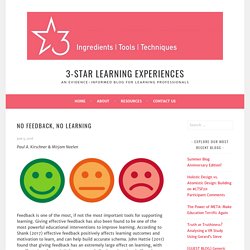
Kirschner & Mirjam Neelen Feedback is one of the most, if not the most important tools for supporting learning. Giving effective feedback has also been found to be one of the most powerful educational interventions to improve learning. According to Shank (2017) effective feedback positively affects learning outcomes and motivation to learn, and can help build accurate schema. John Hattie (2011) found that giving feedback has an extremely large effect on learning, with an effect size of 0,79 (2X the average of all other educational effects)…
UDL checklists – TEU collaborations. Two styles of checklist are available within the UDL toolkit, to guide you in further developing your UDL practice in Moodle.
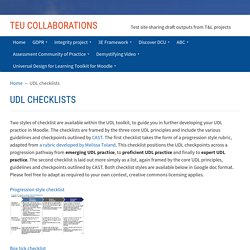
The checklists are framed by the three core UDL principles and include the various guidelines and checkpoints outlined by CAST. The first checklist takes the form of a progression style rubric, adapted from a rubric developed by Melissa Toland. This checklist positions the UDL checkpoints across a progression pathway from emerging UDL practice, to proficient UDL practice and finally to expert UDL practice. The second checklist is laid out more simply as a list, again framed by the core UDL principles, guidelines and checkpoints outlined by CAST. 550 Prompts for Narrative and Personal Writing. [Sign up for our free Learning Network newsletter.
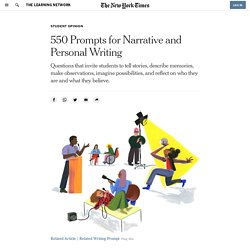
Receive new writing prompts in your inbox every week.] We’ve been posting fresh writing prompts every school day for over a decade now, and every so often we create a themed collection like this one to help you find what you need all in one place. Debates. What is debate?
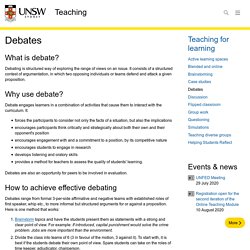
Debating is structured way of exploring the range of views on an issue. It consists of a structured contest of argumentation, in which two opposing individuals or teams defend and attack a given proposition. Why use debate? Debate engages learners in a combination of activities that cause them to interact with the curriculum. It: DePaul University, Chicago. Reflection – Assessment for Learning at King's. “It is not sufficient to have an experience in order to learn.
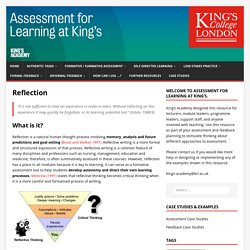
Without reflecting on this experience it may quickly be forgotten, or its learning potential lost.” (Gibbs, 1988:9) Creative Methods of Assessment in Online Learning - Center for Teaching and Learning. Typically when students and instructors hear the word assessment, they think of a long, arduous exam (or a long, repetitive night of grading!).
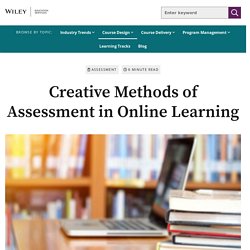
However, an assessment can be any task or activity that evaluates students’ progress toward your course’s learning outcomes. Traditional examples include papers, projects, reflective journals, group work, quizzes, and much more. Online learning has broadened the possibilities of assessment even further because it gives you, the instructor, a wide variety of tools that you can use to help students interact with material in new and exciting ways.
Creative Methods of Assessment in Online Learning - Center for Teaching and Learning.